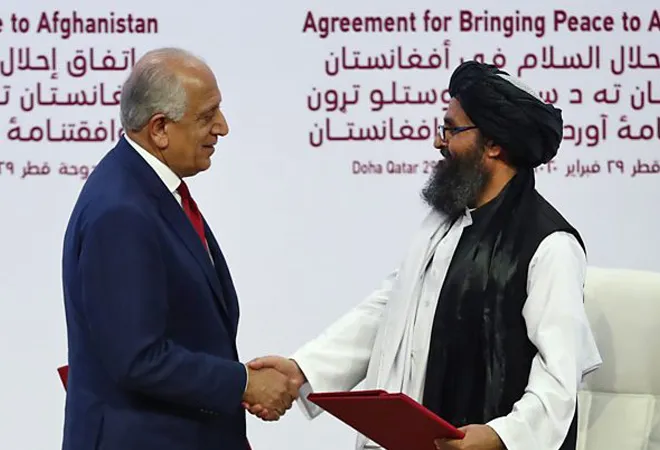-
CENTRES
Progammes & Centres
Location

The current negotiations between the United States and Taliban have taken an interesting turn. A recent article in The Express Tribune has mentioned that during talks held in the UAE, it was proposed that in return for allowing some military bases and guarantees that Afghan soil will not be used for attacks against the West, Afghanistan will receive substantial financial assistance package from the US. The article further mentioned that Pakistan Foreign Minister Shah Mehmood Qureshi’s subsequent foreign visits were meant to precisely discuss with and take into confidence China, Russia and Iran about this development and assuage their concerns.
In retrospect, reconciliation between the Taliban and the United States must not come as a surprise. After all, the two have been old allies in their fight against the USSR in late-1980s.
Moreover, as narrated by Ahmed Rashid in his book ‘The Taliban: The power of militant Islam in Afghanistan and Beyond,’ the Taliban and its members shared a workable relationship with the US to explore economic opportunities between Central Asia, Afghanistan, Pakistan and even America.
From the perspective of ending decades of violence in Afghanistan, the terms and conditions laid by each side from their respective position sounds fair wherein each can claim to be victorious. For the United States, the option to retain bases in Afghanistan enables it to keep a tab on the activities of Taliban and terrorist groups emerging from the Af-Pak region. Additionally, these bases enables United States to pursue its strategic objectives in the region. These bases will also facilitate the US to keep an eye on an emerging nuclear Iran. For the Russians and the Chinese, the proposed deal – although riddled with geopolitical constraints, given the fact that it will help Americans retain a long-term foothold in their backyard – is seen to help curb radicalism in Afghanistan. If radicalism is not kept in check inside Afghanistan and spills over in their neighbourhood, it is bound to create a whole new set of complications and challenges for both Russia and China. Additionally, given the existing Russian and Chinese economic interests in the region, the continuance of US bases is, therefore, likely to be viewed positively by both Moscow and Beijing given the threat to the existing interests of Russia and China in the region.
For the Taliban, if the proposed deal with the US works out, it enables them to interpret the partial withdrawal of Americans as victory. The proposed deal offers them the long-sought legitimacy not only in the eyes of their domestic audience, but also globally. In 1996, when the Taliban had formed the government, very few countries had accorded diplomatic recognition. The proposed deal also enables Taliban to buy more time to gradually expand their political footprint within Afghanistan.
Although the current settlement would ensure short-term political stability and reduce the scale of violence, one cannot help wonder about the sustainability of the proposed arrangement.
How long will the Taliban be able to tolerate the US bases that would continue to operate in their country? Additionally, there is going to be huge ambiguity on the aspect of power sharing within the emerging political setup of Afghanistan. Will the Taliban exhibit maturity and share political power and space with other entities in Afghanistan? This is a question which the departing Americans, regional players and the international community needs to ponder over.
Secondly, it will not be entirely wrong to consider the possibility that Taliban, in all its desperation to ensure US’s withdrawal from Afghanistan, may agree to these conditions for now, only to renege later. There is every possibility that Pakistan, who facilitated the creation of the Taliban in the early 1990s and has been supporting it throughout, has impressed upon the Taliban to create a façade of cooperation only to go back on it once the Americans are further reduced in military size inside Afghanistan. It is also necessary to mention that amidst all this, Pakistan seems pretty excited about the possibility of a US-Taliban deal. For Pakistan, reduction in American security presence in the region enables it to regain its lost strategic space in the region.
India has always emphasised that it would like to see any solution which is Afghan led. At this juncture though, the initiative to talk to Taliban seems more Pakistani-driven.
The disconcerting factor here is that there are no emphatic efforts being made on the part of Americans to seek assurances from Taliban that it will not indulge in undertaking or facilitating activities detrimental to the specific security concerns of regional players such as India. India has every right to be concerned that the American withdrawal will lead to a security void, encouraging Pakistan yet again to indulge in anti-India activities from Afghanistan.
In the last few months, the government of Pakistan has been dropping hints about Pakistan’s willingness for a reconciliation with India. If Pakistan is indeed serious about its efforts at normalising ties, it should have also considered India’s views on Afghanistan.
Instead, Pakistan has been happy to ignore India from its Afghan calculus. As argued by Vikram Sood, Advisor at ORF and former R &AW Chief, Pakistan is merely trying “to keep its eastern border with India quiet” and buying time to carry out its strategic designs.
It is imperative that although President Trump is soliciting the services of Pakistan in striking a deal with the Taliban, India must insist that Pakistan be put on a tight leash from undertaking any destabilising activities inside Afghanistan. In order to deny Pakistan from undertaking any destabilising role even in the long run, India should insist on the international community to ensure self-restrain while committing military and financial aid to Pakistan at this juncture. There is every possibility that any investments made in Pakistan at this critical phase of the Afghan problem would end up being used by Pakistan’s security establishment to embolden the Taliban and further its own political and military agenda in Afghanistan.
The views expressed above belong to the author(s). ORF research and analyses now available on Telegram! Click here to access our curated content — blogs, longforms and interviews.

Sanket Sudhir Kulkarni was Fellow at ORF's Mumbai Centre. Sanket's primary area of interest is studying geopolitics of energy trade. Also, Sanket closely monitors patterns ...
Read More +